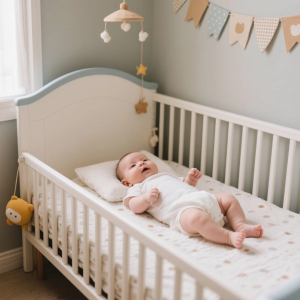
As your due date tiptoes closer, there’s a strange combination of excitement and anxiety that creeps in, even during the calmest moments. One minute you’re folding tiny onesies with a smile, the next you’re staring blankly at your half-zipped hospital bag, wondering if you’ve forgotten something crucial. Every expecting mother, whether it’s her first child or her fourth, eventually faces that moment of standing in the bedroom thinking: “Am I really ready for this?” The truth is, preparing your hospital bag isn’t just about packing essentials—it’s a quiet form of mental preparation, an act of love layered in zippers, soft fabric, and charger cords.
A close friend of mine, Olivia, went into early labor two weeks before her due date. She had only packed her bag halfway, intending to finish it over the weekend. In the middle of the night, while timing contractions and trying to remain calm, she was frantically asking her partner where the comfortable nursing bra was and whether he’d packed the phone charger. In the end, she had her baby girl safely, but she admitted later how not having everything ready made those early hours more chaotic than they needed to be. Since then, she swears by having a hospital bag checklist tucked into her prenatal planner by the third trimester.
One of the first things new moms often forget, surprisingly, is to pack for themselves. Most of the attention naturally goes to baby gear—diapers, swaddles, that cute going-home outfit. But during labor and recovery, it’s the mother who needs the most physical and emotional support. Hospitals provide gowns and socks, yes, but there’s a comfort in wearing your own loose-fitting pajamas, especially those with front openings that make breastfeeding easier. A soft robe, slippers with grip, and oversized underwear designed for postpartum healing are not just luxuries—they’re lifelines. The same goes for personal hygiene items. Hospital-grade soap and shampoo are no match for the gentle, familiar scents from home that can lift your mood during a tough moment. One mom I know brought her favorite lavender face mist and used it during labor breaks—it helped her feel grounded and more like herself amidst all the clinical surroundings 🪻.
Then there’s the often-overlooked tech and convenience gear. Your phone will be your camera, communication lifeline, and in those long early hours, even your entertainment. That means a long phone charger—preferably at least six feet—becomes gold in a hospital room where outlets are never conveniently placed. Don’t underestimate the power of good headphones, especially during downtime or if you’ve made a labor playlist. A portable sound machine or white noise app can be surprisingly helpful if you end up staying overnight with a roommate and need rest. One dad I talked to shared how his wife had loaded her tablet with gentle meditation tracks and soothing birth affirmations, which helped her through a difficult contraction phase. It might seem small, but having those comforts close can change the emotional atmosphere entirely.
Let’s talk snacks. Yes, hospitals offer food, but labor can last for hours, and recovery cravings are real. While most hospitals restrict eating during active labor, it’s still worth packing high-energy, easy-to-digest snacks like granola bars, dried fruit, and electrolyte drinks. Partners, too, often forget to eat in the whirlwind of it all. One couple I met packed a little insulated lunch bag with their favorite protein bites, a couple of instant oatmeal cups, and reusable water bottles. They said it made a big difference in helping them both feel human again in the foggy early hours after delivery.
Speaking of partners, they sometimes forget they’re part of this, too. Many dads or support persons show up unprepared for a night or two at the hospital. A spare change of clothes, a toothbrush, and even a light blanket can help your support person stay comfortable and present. When my sister had her baby, her husband had to run to a nearby drugstore at midnight because he forgot deodorant and socks. Little things, but they matter when you’re both exhausted and running on adrenaline.

And then, of course, comes the moment when it’s time to dress your baby for the first time. This is where so many new parents get caught up. You want it to be perfect. Soft, adorable, maybe even Instagram-worthy. But also, it has to be functional. A newborn onesie with fifty snaps is cute until you’re trying to dress a squirmy baby for the first time. Most nurses recommend bringing at least two simple outfits—one for photos and one for comfort—and don’t forget that hospitals tend to be chilly, so layers like a knit hat or footed pajamas are a good idea. A friend of mine shared how her baby’s first outfit didn’t fit—too big, sleeves flopping past her hands. Luckily, she had tossed a second set in the bag last minute. Now she jokes that her son was already teaching her flexibility on day one 👶.
Insurance documents, birth plans, and ID cards are less glamorous, but packing them helps the logistics go smoothly. Some moms like to bring a printed copy of their birth plan, especially if they’ve discussed preferences like delayed cord clamping or skin-to-skin contact immediately after birth. Others just make sure their medical app is updated and ready. In the thick of labor, no one wants to fumble through a purse for paperwork. Keep these items in an easy-access pouch so they’re ready when needed.
Skincare and small comforts make a quiet difference in how you experience those hours, especially postpartum. Dry lips, chapped hands, and harsh fluorescent lights can make you feel less like yourself. A tinted lip balm, moisturizer, and a good hairbrush can revive you in the moments before meeting guests or just for your own peace of mind. One mother said she didn’t realize how much better she’d feel after a warm shower and brushing her hair, even with the IV still taped to her arm. It wasn’t vanity—it was reconnecting with herself after the powerful storm of birth 🌸.

Finally, there’s a kind of emotional layering that happens with every item you pack. That carefully chosen swaddle might remind you of the nursery you decorated with love. The robe you bring might be the same one you wore through pregnancy, its familiar texture offering comfort. The protein bar you stash might be the same flavor that got you through your first trimester nausea. Everything has meaning. It’s not just a bag—it’s your small cocoon of safety, thoughtfulness, and presence during a life-altering moment.
There’s no such thing as a “perfect” hospital bag, but there is such a thing as one that feels right for you. You’ll discover that even the act of packing it helps you mentally enter the final stretch of pregnancy with more confidence. And when the time comes—whether you grab that bag in a rush at 3 a.m. or calmly zip it up after your water breaks—it’s more than just a collection of items. It’s a reminder that you’re ready, supported, and bringing more than just things with you. You’re bringing strength, calm, and the first tiny details of a brand new life 💼💗.







